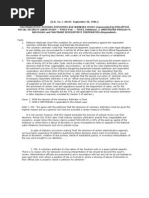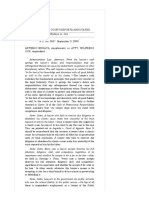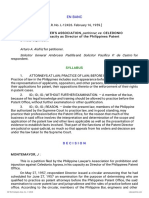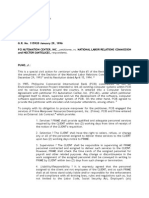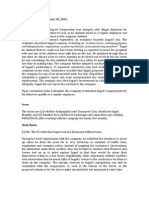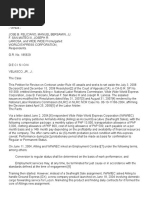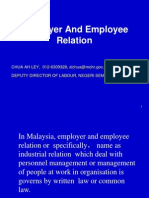0 ratings0% found this document useful (0 votes)
158 viewsDigest Labor
Digest Labor
Uploaded by
Bryan Nartatez BautistaThe Supreme Court ruled that Atok-Big Wedge Mining Co. must determine minimum wage based on what is fair and just, not just actual minimum needs. The minimum must provide a margin over bare necessities to account for rising costs of living.
In a later case, the Court found that San Miguel Corporation workers assigned by cooperative Sunflower were actually employees of SMC, not independent contractors. Though the contract said otherwise, SMC controlled the work and Sunflower lacked its own capital.
In another case, the Court found cooperative CAMPCO was a labor-only contractor for DOLE Philippines. Though registered as a cooperative, CAMPCO members worked full-time at DOLE and lacked independent business
Copyright:
© All Rights Reserved
Available Formats
Download as DOCX, PDF, TXT or read online from Scribd
Digest Labor
Digest Labor
Uploaded by
Bryan Nartatez Bautista0 ratings0% found this document useful (0 votes)
158 views13 pagesThe Supreme Court ruled that Atok-Big Wedge Mining Co. must determine minimum wage based on what is fair and just, not just actual minimum needs. The minimum must provide a margin over bare necessities to account for rising costs of living.
In a later case, the Court found that San Miguel Corporation workers assigned by cooperative Sunflower were actually employees of SMC, not independent contractors. Though the contract said otherwise, SMC controlled the work and Sunflower lacked its own capital.
In another case, the Court found cooperative CAMPCO was a labor-only contractor for DOLE Philippines. Though registered as a cooperative, CAMPCO members worked full-time at DOLE and lacked independent business
Original Description:
labor
Copyright
© © All Rights Reserved
Available Formats
DOCX, PDF, TXT or read online from Scribd
Share this document
Did you find this document useful?
Is this content inappropriate?
The Supreme Court ruled that Atok-Big Wedge Mining Co. must determine minimum wage based on what is fair and just, not just actual minimum needs. The minimum must provide a margin over bare necessities to account for rising costs of living.
In a later case, the Court found that San Miguel Corporation workers assigned by cooperative Sunflower were actually employees of SMC, not independent contractors. Though the contract said otherwise, SMC controlled the work and Sunflower lacked its own capital.
In another case, the Court found cooperative CAMPCO was a labor-only contractor for DOLE Philippines. Though registered as a cooperative, CAMPCO members worked full-time at DOLE and lacked independent business
Copyright:
© All Rights Reserved
Available Formats
Download as DOCX, PDF, TXT or read online from Scribd
Download as docx, pdf, or txt
0 ratings0% found this document useful (0 votes)
158 views13 pagesDigest Labor
Digest Labor
Uploaded by
Bryan Nartatez BautistaThe Supreme Court ruled that Atok-Big Wedge Mining Co. must determine minimum wage based on what is fair and just, not just actual minimum needs. The minimum must provide a margin over bare necessities to account for rising costs of living.
In a later case, the Court found that San Miguel Corporation workers assigned by cooperative Sunflower were actually employees of SMC, not independent contractors. Though the contract said otherwise, SMC controlled the work and Sunflower lacked its own capital.
In another case, the Court found cooperative CAMPCO was a labor-only contractor for DOLE Philippines. Though registered as a cooperative, CAMPCO members worked full-time at DOLE and lacked independent business
Copyright:
© All Rights Reserved
Available Formats
Download as DOCX, PDF, TXT or read online from Scribd
Download as docx, pdf, or txt
You are on page 1of 13
ATOK-BIG WEDGE MINING CO., INC., vs.
ATOK-BIG WEDGE MUTUAL BENEFIT
ASSOCIATION,
G.R. No. L-5276 March 3, 1953
FACTS:
Demand was submitted to petitioner by respondent union through its officers for various
concession, among which were (a) an increase of P0.50 in wages, (b) commutation of sick and
vacation leave if not enjoyed during the year, (c) various privileges, such as free medical care,
medicine, and hospitalization, (d) right to a closed shop, check off, etc., (e) no dismissal without
prior just cause and with a prior investigation, etc. Some of the demands, were granted by the
petitioner, and the other were rejected, and so hearings were held and evidence submitted on
the latter. After the hearing the respondent court rendered a decision, the most important
provisions of which were those fixing the minimum wage for the laborers at P3.20, declaring that
additional compensation representing efficiency bonus should not be included as part of the
wage, and making the award effective from September 4, 1950. It is against these portion of the
decision that this appeal is taken.
On the issue of the wage, it is contended by petitioner that as the respondent court found that
the laborer and his family at least need the amount of P2.58 for food, this should be the basis
for the determination of his wage, not what he actually spends; that it is not justifiable to fix a
wage higher than that provided by Republic Act No. 602; and that respondent union made the
demand in accordance with a pernicious practice of claiming more after an original demand is
granted. The respondent court found that P2.58 is the minimum amount actually needed by the
laborer and his family
ISSUE:
What will be the basis to determine the minimum wage.
RULING:
A person's needs increase as his means increase. This is true not only as to food but as to
everything else education, clothing, entertainment, etc. The law guarantees the laborer a fair
and just wage. The minimum must be fair and just. The "minimum wage" can by no means
imply only the actual minimum. Some margin or leeway must be provided, over and above the
minimum, to take care of contingencies such as increase of prices of commodities and desirable
improvement in his mode of living.
SAN MIGUEL CORPORATION v. PROSPERO ABALLA
G.R. No. 149011 June 28, 2005
Ponente: CARPIO-MORALES, J .:
FACTS: Petitioner San Miguel Corporation (SMC) and Sunflower Multi-Purpose Cooperative
(Sunflower) entered into a one-year Contract of Service and such contract is renewed on a
monthly basis until terminated. Pursuant to this, respondent Prospero Aballa rendered services
to SMC.
After one year of service, Aballa filed a complaint before NLRC praying that they be declared as
regular employees of SMC. On the other hand, SMC filed before the DOLE a Notice of Closure
due to serious business losses. Hence, the labor arbiter dismissed the complaint and ruled in
favor of SMC. Aballa then appealed before the NLRC. The NLRC dismissed the appeal finding
that Sunflower is an independent contractor.
On appeal, the Court of Appeals reversed NLRCs decision on the ground that the agreement
between SMC and Sunflower showed a clear intent to abstain from establishing an employer-
employee relationship.
ISSUE: Whether or not Aballa and other employees of Sunflower are employees of SMC?
HELD: The test to determine the existence of independent contractorship is whether one
claiming to be an independent contractor has contracted to do the work according to his own
methods and without being subject to the control of the employer, except only as to the results
of the work. In legitimate labor contracting, the law creates an employer-employee relationship
for a limited purpose, to ensure that the employees are paid their wages. The principal employer
becomes jointly and severally liable with the job contractor, only for the payment of the
employees wages whenever the contractor fails to pay the same. Other than that, the principal
employer is not responsible for any claim made by the employees. In labor-only contracting, the
statute creates an employer-employee relationship for a comprehensive purpose: to prevent a
circumvention of labor laws. The contractor is considered merely an agent of the principal
employer and the latter is responsible to the employees of the labor-only contractor as if such
employees had been directly employed by the principal employer.
The Contract of Services between SMC and Sunflower shows that the parties clearly disavowed
the existence of an employer-employee relationship between SMC and private respondents.
The language of a contract is not, however, determinative of the parties relationship; rather it is
the totality of the facts and surrounding circumstances of the case. A party cannot dictate, by
the mere expedient of a unilateral declaration in a contract, the character of its business,
whether as labor-only contractor or job contractor, it being crucial that its character be measured
in terms of and determined by the criteria set by statute. What appears is that Sunflower does
not have substantial capitalization or investment in the form of tools, equipment, machineries,
work premises and other materials to qualify it as an independent contractor. On the other hand,
it is gathered that the lot, building, machineries and all other working tools utilized by Aballa et
al. in carrying out their tasks were owned and provided by SMC.
And from the job description provided by SMC itself, the work assigned to Aballa et al. was
directly related to the aquaculture operations of SMC. As for janitorial and messengerial
services, that they are considered directly related to the principal business of the employer has
been jurisprudentially recognized. Furthermore, Sunflower did not carry on an independent
business or undertake the performance of its service contract according to its own manner and
method, free from the control and supervision of its principal, SMC, its apparent role having
been merely to recruit persons to work for SMC.
All the foregoing considerations affirm by more than substantial evidence the existence of an
employer- employee relationship between SMC and Aballa. Since Aballa who were engaged in
shrimp processing performed tasks usually necessary or desirable in the aquaculture business
of SMC, they should be deemed regular employees of the latter and as such are entitled to all
the benefits and rights appurtenant to regular employment. They should thus be awarded
differential pay corresponding to the difference between the wages and benefits given them and
those accorded SMCs other regular employees.
DOLE Phils. vs. Esteva, G.R. No. 161115, November 30, 2006
FACTS:
Petitioner is a corporation duly recognized and existing in accordance with Philippine laws, engaged
principally in the production and processing of pineapple for the export market. Its plantation is
located in Polomolok, South Cotabato .
Respondents are members of the Cannery Multi-Purpose Cooperative (CAMPCO). CAMPCO was
organized in accordance with R.A. No. 6938, otherwise known as the Cooperative Code of the
Philippines , and duly registered with the Cooperative Development Authority (CDA) on 6 January
1993. Members of CAMPCO live in communities surrounding petitioners plantation and are relatives of
petitioners employees.
On 17 August 1993, petitioner and CAMPCO entered into a Service Contract. The Service Contract
referred to petitioner as the Company, while CAMPCO was the Contractor. The said contract was
good for six months.
Pursuant to the contract, CAMPCO members rendered services to petitioner. The parties apparently
extended or renewed the same for the succeeding years without executing another written contract.
However, due to investigations and reliable information, the Regional Director of DOLE exercised his
visitorial and enforcement power and found out that CAMPCO is engaged in labor-only contracting
together with two other cooperatives.
The Law cited was Section 9, Rule VIII, Book III of the Omnibus Rules Implementing the Labor Code.
(pertaining to Labor-only contracting 1. no substantial capital; 2. work is directly related to the
principal business of the principal b. in such case, the one who alleges as contractor is deemed an
agent of the principal while the latter will latter is considered the indirect employer for purposes of
enforcement of the labor rights.)
Before the NLRC, respondents contended that they have been working more than one year too
petitioner. While some of the respondents were still working for petitioner, others were put on stay
home status on varying dates in the years 1994, 1995, and 1996 and were no longer furnished with
work thereafter. They, then, filed a case before the NLRC for illegal dismissal, regularization, wage
differentials, damages and attorneys fees.
Respondents argued that they should be considered regular employees of petitioner given that: 1.
they were performing jobs that were usually necessary and desirable in the usual business of
petitioner; 2. petitioner exercised control over respondents, not only as to the results, but also as to
the manner by which they performed their assigned tasks; and 3. CAMPCO, a labor-only contractor,
was merely a conduit of petitioner. As regular employees of petitioner, respondents asserted that they
were entitled to security of tenure and those placed on stay home status for more than six months
had been constructively and illegally dismissed. Respondents further claimed entitlement to wage
differential, moral damages, and attorneys fees.
NLRC affirmed the Labor Arbiters decision. CA also affirmed.
ISSUES: Whether the lower courts were correct in ruling that Petitioner is the employer of
respondents and that CAMPCO be considered merely as agent of the company
HELD:
In summary, this Court finds that CAMPCO was a labor-only contractor and, thus, petitioner is the real
employer of the respondents, with CAMPCO acting only as the agent or intermediary of petitioner. Due
to the nature of their work and length of their service, respondents should be considered as regular
employees of petitioner. Petitioner constructively dismissed a number of the respondents by placing
them on "stay home status" for over six months, and was therefore guilty of illegal dismissal.
Petitioner must accord respondents the status of regular employees, and reinstate the respondents
who it constructively and illegally dismissed, to their previous positions, without loss of seniority rights
and other benefits, and pay these respondents backwages from the date of filing of the Complaint
with the NLRC on 19 December 1996 up to actual reinstatement.
CRITERIA TO ESTABLISH THE EXISTENCE OF AN INDEPENDENT AND PERMISSIBLE CONTRACTOR
RELATIONSHIP
generally established by the following criteria: whether or not the contractor is carrying on an
independent business; the nature and extent of the work; the skill required; the term and duration of
the relationship; the right to assign the performance of a specified piece of work; the control and
supervision of the work to another; the employer's power with respect to the hiring, firing and
payment of the contractor's workers; the control of the premises; the duty to supply the premises
tools, appliances, materials and labor; and the mode, manner and terms of payment
SEVERAL FACTORS ARE PRESENT IN THE CASE TO ESTABLISH A LABOR- ONLY CONTRACTING
ARRANGEMENT BY BETWEEN THE MANAGEMENT AND CAMPCO
While there is present in the relationship of petitioner and CAMPCO some factors suggestive of an
independent contractor relationship (i.e., CAMPCO chose who among its members should be sent to
work for petitioner; petitioner paid CAMPCO the wages of the members, plus a percentage thereof as
administrative charge; CAMPCO paid the wages of the members who rendered service to petitioner),
many other factors are present which would indicate a labor-only contracting arrangement between
petitioner and CAMPCO.
First, although petitioner touts the multi-million pesos assets of CAMPCO, it does well to remember
that such were amassed in the years following its establishment. In 1993, when CAMPCO was
established and the Service Contract between petitioner and CAMPCO was entered into, CAMPCO only
had P6,600.00 paid-up capital, which could hardly be considered substantial. It only managed to
increase its capitalization and assets in the succeeding years by continually and defiantly engaging in
what had been declared by authorized DOLE officials as labor-only contracting.
Second, CAMPCO did not carry out an independent business from petitioner. It was precisely
established to render services to petitioner to augment its workforce during peak seasons. Petitioner
was its only client. Even as CAMPCO had its own office and office equipment, these were mainly used
for administrative purposes; the tools, machineries, and equipment actually used by CAMPCO
members when rendering services to the petitioner belonged to the latter.
Third, petitioner exercised control over the CAMPCO members, including respondents. Petitioner
attempts to refute control by alleging the presence of a CAMPCO supervisor in the work premises. Yet,
the mere presence within the premises of a supervisor from the cooperative did not necessarily mean
that CAMPCO had control over its members. Section 8(1), Rule VIII, Book III of the implementing
rules of the Labor Code, as amended, required for permissible job contracting that the contractor
undertakes the contract work on his account, under his own responsibility, according to his own
manner and method, free from the control and direction of his employer or principal in all matters
connected with the performance of the work except as to the results thereof. As alleged by the
respondents, and unrebutted by petitioner, CAMPCO members, before working for the petitioner, had
to undergo instructions and pass the training provided by petitioners personnel. It was petitioner who
determined and prepared the work assignments of the CAMPCO members. CAMPCO members worked
within petitioners plantation and processing plants alongside regular employees performing identical
jobs, a circumstance recognized as an indicium of a labor-only contractorship.
Fourth, CAMPCO was not engaged to perform a specific and special job or service. In the Service
Contract of 1993, CAMPCO agreed to assist petitioner in its daily operations, and perform odd jobs as
may be assigned. CAMPCO complied with this venture by assigning members to petitioner. Apart from
that, no other particular job, work or service was required from CAMPCO, and it is apparent, with such
an arrangement, that CAMPCO merely acted as a recruitment agency for petitioner. Since the
undertaking of CAMPCO did not involve the performance of a specific job, but rather the supply of
manpower only, CAMPCO clearly conducted itself as a labor-only contractor.
Lastly, CAMPCO members, including respondents, performed activities directly related to the principal
business of petitioner. They worked as can processing attendant, feeder of canned pineapple and
pineapple processing, nata de coco processing attendant, fruit cocktail processing attendant, and etc.,
functions which were, not only directly related, but were very vital to petitioners business of
production and processing of pineapple products for export.
The findings enumerated in the preceding paragraphs only support what DOLE Regional Director Parel
and DOLE Undersecretary Trajano had long before conclusively established, that CAMPCO was a mere
labor-only contractor
EMPLOYER- EMPLOYEE RELATIONSHIP EXIST BETWEEN THE PETITIONER AND THE RESPONDENT
WITH THE DECLARATION THAT CAMPCO WAS ENGAGED IN THE PROHIBITED ACTS OF LABOR-ONLY
CONTRACTING
The declaration that CAMPCO is indeed engaged in the prohibited activities of labor-only contracting,
then consequently, an employer-employee relationship is deemed to exist between petitioner and
respondents, since CAMPCO shall be considered as a mere agent or intermediary of petitioner
RESPONDENTS ARE CONSIDERED REGULAR EMPLOYEES FOR THEY PERFORMED ACTIVITIES THAT
ARE NECESSARY OR DESIRABLE TO THE USUAL BUSINESS OF THE PETITIONER
Since respondents are now recognized as employees of petitioner, this Court is tasked to determine
the nature of their employment. In consideration of all the attendant circumstances in this case, this
Court concludes that respondents are regular employees of petitioner.
In the instant Petition, petitioner is engaged in the manufacture and production of pineapple products
for export. Respondents rendered services as processing attendant, feeder of canned pineapple and
pineapple processing, nata de coco processing attendant, fruit cocktail processing attendant, and etc.,
functions they performed alongside regular employees of the petitioner. There is no doubt that the
activities performed by respondents are necessary or desirable to the usual business of petitioner.
Petitioner likewise want this Court to believe that respondents employment was dependent on the
peaks in operation, work backlogs, absenteeism, and excessive leaves. However, bearing in mind that
respondents all claimed to have worked for petitioner for over a year, a claim which petitioner failed to
rebut, then respondents continued employment clearly demonstrates the continuing necessity and
indispensability of respondents employment to the business of petitioner.
THE COMPANYS ACT OF PLACING SOME OF THE RESPONDENTS ON "STAY HOME STATUS" AND NOT
GIVING THEM WORK ASSIGNMENTS FOR MORE THAN SIX MONTHS WERE ALREADY TANTAMOUNT TO
CONSTRUCTIVE AND ILLEGAL DISMISSAL
Respondents, as regular employees of petitioner, are entitled to security of tenure. They could only be
removed based on just and authorized causes as provided for in the Labor Code, as amended, and
after they are accorded procedural due process. Therefore, petitioners acts of placing some of the
respondents on "stay home status" and not giving them work assignments for more than six months
were already tantamount to constructive and illegal dismissal
VIRGINIA G. NERI and JOSE CABELIN, petitioners,
vs.
NATIONAL LABOR RELATIONS COMMISSION FAR EAST BANK & TRUST COMPANY
(FEBTC) and BUILDING CARE CORPORATION, respondents
GR nos. 97008-09
FACTS:
Building Care Corporation (BCC, for brevity), in the proceedings below, established that it had
substantial capitalization of P1 Million or a stockholders equity of P1.5 Million. Thus the Labor
Arbiter ruled that BCC was only job contracting and that consequently its employees were not
employees of Far East Bank and Trust Company (FEBTC, for brevity). on appeal, this factual
finding was affirmed by respondent National Labor Relations Commission (NLRC, for brevity).
Nevertheless, petitioners insist before us that BCC is engaged in "labor-only" contracting hence,
they conclude, they are employees of respondent FEBTC.
Petitioners Virginia G. Neri and Jose Cabelin applied for positions with, and were hired by,
respondent BCC, a corporation engaged in providing technical, maintenance, engineering,
housekeeping, security and other specific services to its clientele. They were assigned to work
in the Cagayan de Oro City Branch of respondent FEBTC on 1 May 1979 and 1 August 1980,
respectively, Neri an radio/telex operator and Cabelin as janitor, before being promoted to
messenger on 1 April 1989.
On 28 June 1989, petitioners instituted complaints against FEBTC and BCC before Regional
Arbitration Branch No. 10 of the Department of Labor and Employment to compel the bank to
accept them as regular employees and for it to pay the differential between the wages being
paid them by BCC and those received by FEBTC employees with similar length of service.
On 16 November 1989, the Labor Arbiter dismissed the complaint for lack of merit.
Respondent
BCC was considered an independent contractor because it proved it had substantial capital.
Thus, petitioners were held to be regular employees of BCC, not FEBTC. The dismissal was
appealed to NLRC which on 28 September 1990 affirmed the decision on appeal.
On 22
October 1990, NLRC denied reconsideration of its affirmance,
prompting petitioners to seek
redress from this Court.
Petitioners vehemently contend that BCC in engaged in "labor-only" contracting because it
failed to adduce evidence purporting to show that it invested in the form of tools, equipment,
machineries, work premises and other materials which are necessary in the conduct of its
business. Moreover, petitioners argue that they perform duties which are directly related to the
principal business or operation of FEBTC. If the definition of "labor-only" contracting
is to be
read in conjunction with job contracting,
then the only logical conclusion is that BCC is a "labor
only" contractor. Consequently, they must be deemed employees of respondent bank by
operation of law since BCC is merely an agent of FEBTC following the doctrine laid down in
Philippine Bank of Communications v. National Labor Relations Commission
where we ruled
that where "labor-only" contracting exists, the Labor Code itself establishes an employer-
employee relationship between the employer and the employees of the "labor-only" contractor;
hence, FEBTC should be considered the employer of petitioners who are deemed its employees
through its agent, "labor-only" contractor BCC.
ISSUE:
Whether or not FEBTC should be considered the employer of petitioners who are deemed its
employees through its agent, labor-only BCC.
HELD:
Article 106 of the Labor Code defines "labor-only" contracting thus
Art. 106. Contractor or subcontractor. . . . . There is "labor-only" contracting
where the person supplying workers to an employer does not have substantial
capital or investment in the form of tools, equipment, machineries, work
premises, among others, and the workers recruited by such persons are
performing activities which are directly related to the principal business of such
employer . . . . (emphasis supplied).
Based on the foregoing, BCC cannot be considered a "labor-only" contractor because it has
substantial capital. While there may be no evidence that it has investment in the form of tools,
equipment, machineries, work premises, among others, it is enough that it has substantial
capital, as was established before the Labor Arbiter as well as the NLRC.
Even assuming ex argumenti that petitioners were performing activities directly related to the
principal business of the bank, under the "right of control" test they must still be considered
employees of BCC. In the case of petitioner Neri, it is admitted that FEBTC issued a job
description which detailed her functions as a radio/telex operator. However, a cursory reading of
the job description shows that what was sought to be controlled by FEBTC was actually the
end-result of the task, e.g., that the daily incoming and outgoing telegraphic transfer of funds
received and relayed by her, respectively, tallies with that of the register. The guidelines were
laid down merely to ensure that the desired end-result was achieved. It did not, however, tell
Neri how the radio/telex machine should be operated.
Besides, petitioners do not deny that they were selected and hired by BCC before being
assigned to work in the Cagayan de Oro Branch of FFBTC. BCC likewise acknowledges that
petitioners are its employees. The record is replete with evidence disclosing that BCC
maintained supervision and control over petitioners through its Housekeeping and Special
Services Division: petitioners reported for work wearing the prescribed uniform of BCC; leaves
of absence were filed directly with BCC; and, salaries were drawn only from BCC.
The determination of employer-employee relationship involves factual findings. Absent any
grave abuse of discretion, and we find none in the case before us, we are bound by the findings
of the Labor Arbiter as affirmed by respondent NLRC.
. FILIPINAS SYNTHETIC FIBER CORPORATION (FILSYN), petitioner, vs. NATIONAL LABOR
RELATIONS COMMISSION, LABOR ARBITER VOLTAIRE A. BALITAAN, FELIPE LOTERTE and
DE LIMA TRADING & GENERAL SERVICES, respondents. [G.R. No. 113347. June 14, 1996
De Lima Trading was found to be engaged in an independent job contracting since it is a highly
capitalized venture and the janitorial services performed by Loterte although may be considered
directly related to the business of FILSYN is nevertheless necessary in its operation, without which
production and company sales will not suffer.
However, with respect to liability, notwithstanding the lack of a direct employer-employee relationship
between FILSYN and Felipe Loterte, the FILSYN is still jointly and severally liable with respondent DE
LIMA for Lotertes monetary claims under Art. 109 of the Labor Code without prejudice to the right of
FILSYN to seek reimbursement from DE LIMA for whatever amount it will have to pay Loterte.
ERNESTO M. APODACA, petitioner,
vs.
NATIONAL LABOR RELATIONS COMMISSION, JOSE M. MIRASOL and INTRANS PHILS.,
INC., respondents.
G.R. No. 80039 April 18, 1989
GANCAYCO, J.:
FACTS: Petitioner was employed in respondent corporation. He was persuaded by respondent Mirasol
to subscribe to 1,500 shares or for a total of P150,000.00. He paid P37,500.00. On September 1, 1975,
petitioner was appointed President and General Manager of the respondent corporation. However, on
January 2, 1986, he resigned. petitioner instituted with the NLRC a complaint against private
respondents for the payment of his unpaid wages, his cost of living allowance, the balance of his
gasoline and representation expenses and his bonus compensation for 1986. Private respondents
admitted that there is due to petitioner the amount of P17,060.07 but this was applied to the unpaid
balance of his subscription in the amount of P95,439.93. Petitioner questioned the set-off alleging that
there was no call or notice for the payment of the unpaid subscription and that, accordingly, the alleged
obligation is not enforceable.
ISSUES: (1) Whether or not NLRC has jurisdiction to resolve a claim for non-payment of stock
subscriptions to a corporation. (2) If so, whether or not an obligation arising therefrom be offset against
a money claim of an employee against the employer.
RULING: (1) NLRC has no jurisdiction to determine such intra-corporate dispute between the
stockholder and the corporation as in the matter of unpaid subscriptions. This controversy is within the
exclusive jurisdiction of the Securities and Exchange Commission.
(2) No. the unpaid subscriptions are not due and payable until a call is made by the corporation for
payment. Private respondents have not presented a resolution of the board of directors of respondent
corporation calling for the payment of the unpaid subscriptions. It does not even appear that a notice of
such call has been sent to petitioner by the respondent corporation. As there was no notice or call for
the payment of unpaid subscriptions, the same is not yet due and payable.
Even if there was a call for payment, the NLRC cannot validly set it off against the wages and other
benefits due petitioner. Article 113 of the Labor Code allows such a deduction from the wages of the
employees by the employer, only in three instances.
You might also like
- Award 24837Document13 pagesAward 24837averroes7No ratings yet
- CD - 30. Arnobit v. ArnobitDocument2 pagesCD - 30. Arnobit v. ArnobitCzarina CidNo ratings yet
- General Training Question Paper Test 11Document22 pagesGeneral Training Question Paper Test 11Joshua Jethroh67% (6)
- Letter of Termination Serious Misconduct Summary DismissalDocument4 pagesLetter of Termination Serious Misconduct Summary DismissalEdward AlmazanNo ratings yet
- Rapanut vs. Court of AppealsDocument2 pagesRapanut vs. Court of AppealsRodelle LavariasNo ratings yet
- Diana Ramos Vs Atty Jose ImbangDocument5 pagesDiana Ramos Vs Atty Jose ImbangCarl AJNo ratings yet
- 2 Quiambao Vs BambaDocument6 pages2 Quiambao Vs BambaLimberge Paul CorpuzNo ratings yet
- Gonzales Vs Ge. AbayaDocument1 pageGonzales Vs Ge. AbayaRoss LyneNo ratings yet
- Songco Et - Al v. National Labor Relations Commission GR No. 50999-5100, March 23, 1990 2Document6 pagesSongco Et - Al v. National Labor Relations Commission GR No. 50999-5100, March 23, 1990 2PIKACHUCHIENo ratings yet
- Double Jeopardy PaperDocument1 pageDouble Jeopardy PaperStephanie Praise FernandezNo ratings yet
- Mantrade DigestDocument1 pageMantrade DigestG Carlo TapallaNo ratings yet
- JUAN DULALIA, JR., Complainant, Vs - ATTY. PABLO C. CRUZ, RespondentDocument8 pagesJUAN DULALIA, JR., Complainant, Vs - ATTY. PABLO C. CRUZ, Respondentroyel arabejoNo ratings yet
- AQUINO v. CASABARDocument3 pagesAQUINO v. CASABAREdsel Ian S. FuentesNo ratings yet
- Endaya Vs OcaDocument14 pagesEndaya Vs OcaAngelie FloresNo ratings yet
- People Vs PurisimaDocument4 pagesPeople Vs PurisimaAname Barredo0% (1)
- 120-Paces Industrial Corp. v. SalandananDocument5 pages120-Paces Industrial Corp. v. SalandananAnna Fe SyNo ratings yet
- 20th Century Fox Film Corporation V CADocument2 pages20th Century Fox Film Corporation V CAKrys Martinez100% (1)
- Luzon Stevedoring vs. Luzon Marine Department UnionDocument6 pagesLuzon Stevedoring vs. Luzon Marine Department UnionAnonymous 33LIOv6LNo ratings yet
- Property Case Digest 19-23Document12 pagesProperty Case Digest 19-23ZethMoranaNo ratings yet
- Quingwa v. PunoDocument4 pagesQuingwa v. PunoJasmin ApostolesNo ratings yet
- 101 Phil 323 in Re Disbarment V JaranilloDocument1 page101 Phil 323 in Re Disbarment V JaranillosashinaNo ratings yet
- Misamin V San JuanDocument2 pagesMisamin V San JuanjennyMBNo ratings yet
- 21 - Bobis Vs BobisDocument1 page21 - Bobis Vs BobisEunice IgnacioNo ratings yet
- Li vs. PeopleDocument16 pagesLi vs. PeopleRhev Xandra AcuñaNo ratings yet
- Medina - People v. Sahibil, Cabral v. BracamonteDocument2 pagesMedina - People v. Sahibil, Cabral v. BracamonteTiara MedinaNo ratings yet
- De Lima Vs GuerreroDocument14 pagesDe Lima Vs Guerreroinsert nameNo ratings yet
- Piatt vs. Abordo (58 Phil 350 - September 1, 1933)Document1 pagePiatt vs. Abordo (58 Phil 350 - September 1, 1933)Kathlene Pineda100% (1)
- 210841-2017-Department of Public Works and Highways V.20220205-11-1oo5z1pDocument30 pages210841-2017-Department of Public Works and Highways V.20220205-11-1oo5z1pSalcedo YehoNo ratings yet
- Legal Ethics 2nd Exam CompilationDocument12 pagesLegal Ethics 2nd Exam CompilationCnfsr KayceNo ratings yet
- Digest 4th BatchDocument9 pagesDigest 4th BatchBeverlyn JamisonNo ratings yet
- 253 Filoteo Vs SandiganbayanDocument1 page253 Filoteo Vs SandiganbayanMary Grace EvangelistaNo ratings yet
- Unity Fishing Vs Atty. MacalinaoDocument8 pagesUnity Fishing Vs Atty. MacalinaobogoldoyNo ratings yet
- Fernandez V BelloDocument2 pagesFernandez V BelloRuab PlosNo ratings yet
- Chua vs. Atty. JimenezDocument5 pagesChua vs. Atty. JimenezRed HoodNo ratings yet
- Canon 1 Digest CasesDocument46 pagesCanon 1 Digest CasesSM BAr100% (1)
- Quita vs. Ca DigestDocument1 pageQuita vs. Ca DigestTasneem C BalindongNo ratings yet
- PORAC TRUCKING INC. v. CADocument1 pagePORAC TRUCKING INC. v. CACharlie BallesterosNo ratings yet
- Uy V Ca - 314 Scra 69Document11 pagesUy V Ca - 314 Scra 69Krista YntigNo ratings yet
- Republic Vs NillasDocument8 pagesRepublic Vs NillasSachuzenNo ratings yet
- PEOPLE vs. VELASCO (252 SCRA 135) FACTS: Respondent Was ApprehendedDocument3 pagesPEOPLE vs. VELASCO (252 SCRA 135) FACTS: Respondent Was Apprehendedbayi88No ratings yet
- 58 Endaya vs. OcaDocument6 pages58 Endaya vs. OcaZaireXandraReyesNo ratings yet
- Alonzo Vs RelamidaDocument6 pagesAlonzo Vs RelamidaMar JoeNo ratings yet
- 138 NASECO Vs National Servuce CorporationDocument2 pages138 NASECO Vs National Servuce CorporationMalolosFire BulacanNo ratings yet
- Licudan Vs CA, 193SCRA293Document7 pagesLicudan Vs CA, 193SCRA293FredamoraNo ratings yet
- Lawyer and Client (Digests)Document15 pagesLawyer and Client (Digests)mcfalcantaraNo ratings yet
- PUP Enrollment Payment Voucher PDFDocument3 pagesPUP Enrollment Payment Voucher PDFGiulia Tabara100% (1)
- People vs. Talaro Et Al (March 20, 2012) GR #175781Document11 pagesPeople vs. Talaro Et Al (March 20, 2012) GR #175781mque12No ratings yet
- Bautista V Gonzales 182 SCRA 151Document3 pagesBautista V Gonzales 182 SCRA 151JuvitNo ratings yet
- Fontana Resort and Country Club, Inc. vs. TanDocument20 pagesFontana Resort and Country Club, Inc. vs. TanXtine CampuPotNo ratings yet
- Philippine Lawyer S Association v. AgravaDocument7 pagesPhilippine Lawyer S Association v. AgravaCMLNo ratings yet
- Facts : Anonymous V. Judge Bill D. BuyucanDocument3 pagesFacts : Anonymous V. Judge Bill D. BuyucanBryan Jay NuiqueNo ratings yet
- Philip Morris v. CA (G.R. No. 91332)Document2 pagesPhilip Morris v. CA (G.R. No. 91332)James AndrinNo ratings yet
- Dna Evidence Case DigestDocument8 pagesDna Evidence Case DigestChiic-chiic SalamidaNo ratings yet
- 12.21 U.S. VS SMITH, G.R. No. 14057Document7 pages12.21 U.S. VS SMITH, G.R. No. 14057nazhNo ratings yet
- 169291-2014-Nebreja v. ReonalDocument5 pages169291-2014-Nebreja v. ReonalGericah RodriguezNo ratings yet
- Janssen Pharmaceutica vs. Benjamin SilayroDocument3 pagesJanssen Pharmaceutica vs. Benjamin SilayroManz Edam C. JoverNo ratings yet
- Hueysuwan v. Florido 20 Jan 04Document4 pagesHueysuwan v. Florido 20 Jan 04Fresha Anne EndicoNo ratings yet
- Legal Ethics 06Document8 pagesLegal Ethics 06BAROPSNo ratings yet
- SpecPro - Digest of Habeas Corpus and Amparo CaseDocument2 pagesSpecPro - Digest of Habeas Corpus and Amparo CaseArvin Antonio OrtizNo ratings yet
- Cruz Vs SalvaDocument5 pagesCruz Vs SalvaUnknown userNo ratings yet
- San Miguel To BrentDocument10 pagesSan Miguel To BrentSandra MagalangNo ratings yet
- PAL v. Ligan (G.R. No. 146408)Document8 pagesPAL v. Ligan (G.R. No. 146408)roger delosNo ratings yet
- San Miguel Corporation Vs Aballa Case DigestDocument2 pagesSan Miguel Corporation Vs Aballa Case DigestfendyNo ratings yet
- Compilation of Digest in TranspoDocument101 pagesCompilation of Digest in TranspoBryan Nartatez Bautista100% (1)
- Transmission of Nerve ImpulsesDocument20 pagesTransmission of Nerve ImpulsesBryan Nartatez BautistaNo ratings yet
- A.M. No. P-11-2888Document5 pagesA.M. No. P-11-2888Bryan Nartatez BautistaNo ratings yet
- Pci Vs NLRCDocument9 pagesPci Vs NLRCBryan Nartatez BautistaNo ratings yet
- Case Digest TranspoDocument8 pagesCase Digest TranspoBryan Nartatez BautistaNo ratings yet
- Hernandez Vs CADocument7 pagesHernandez Vs CABryan Nartatez BautistaNo ratings yet
- Crim ProcDocument55 pagesCrim ProcBryan Nartatez BautistaNo ratings yet
- Davao Fruits Corporation Vs Associated Labor UnionsDocument1 pageDavao Fruits Corporation Vs Associated Labor UnionsBryan Nartatez BautistaNo ratings yet
- Summary, Conclusion and RecommendationDocument15 pagesSummary, Conclusion and RecommendationBryan Nartatez BautistaNo ratings yet
- Substantive Issues:: Health Care ProvidersDocument5 pagesSubstantive Issues:: Health Care ProvidersBryan Nartatez BautistaNo ratings yet
- CRIM LAW CASES (IntodvsCA & PeoplevsSaladino)Document3 pagesCRIM LAW CASES (IntodvsCA & PeoplevsSaladino)Bryan Nartatez BautistaNo ratings yet
- Why Named LuisitaDocument17 pagesWhy Named LuisitaBryan Nartatez BautistaNo ratings yet
- Hagonoy Water District vs. NLRCDocument5 pagesHagonoy Water District vs. NLRCPollyana TanaleonNo ratings yet
- Labor Art. 1-6Document26 pagesLabor Art. 1-6Irish GarciaNo ratings yet
- Labor 1 Polyfoam-RGC International Inc. vs. Concepcion: Supreme CourtDocument13 pagesLabor 1 Polyfoam-RGC International Inc. vs. Concepcion: Supreme CourtthefiledetectorNo ratings yet
- Labrel Case Digest Illegal DismissalDocument14 pagesLabrel Case Digest Illegal DismissalArgel Joseph Cosme67% (3)
- Cosmos Bottling Corp Vs FerminDocument4 pagesCosmos Bottling Corp Vs FerminNica09_foreverNo ratings yet
- Phillippines Labor CodeDocument3 pagesPhillippines Labor CodeTurboyNavarroNo ratings yet
- Magis v. ManaloDocument2 pagesMagis v. ManaloJovita Junio-EnguioNo ratings yet
- Kapisanang Manggagawa V NLRCDocument3 pagesKapisanang Manggagawa V NLRCpurplebasketNo ratings yet
- PT&T V CADocument2 pagesPT&T V CAeieipayadNo ratings yet
- Pakistan International Airlines Corporation v. Blas F. Ople, Et Al. G.R. No. 61594 September 28, 1990Document9 pagesPakistan International Airlines Corporation v. Blas F. Ople, Et Al. G.R. No. 61594 September 28, 1990Ivan Angelo ApostolNo ratings yet
- Digests 81 90Document12 pagesDigests 81 90Olivia FelNo ratings yet
- Judgment - Overberg Fishing (Pty) LTD Vs Alfonso Villar DecampoDocument9 pagesJudgment - Overberg Fishing (Pty) LTD Vs Alfonso Villar DecampoAndré Le RouxNo ratings yet
- 2002 Labor Bar Q &ADocument13 pages2002 Labor Bar Q &AHeber BacolodNo ratings yet
- Asia Pacific Chartering Vs Farolan DigestDocument1 pageAsia Pacific Chartering Vs Farolan Digestadonis.orillaNo ratings yet
- Anonymous VDocument5 pagesAnonymous VEnav LucuddaNo ratings yet
- General Training ReadingDocument13 pagesGeneral Training Readingaditi kabirNo ratings yet
- Ken LaborDocument229 pagesKen LaborÆsir Thor TristanNo ratings yet
- UIC vs. Office of SOLEDocument3 pagesUIC vs. Office of SOLEfay garneth buscatoNo ratings yet
- Cavite Apparel V MarquezDocument6 pagesCavite Apparel V MarquezKennethQueRaymundoNo ratings yet
- Citibank vs. NLRCDocument6 pagesCitibank vs. NLRCRan NgiNo ratings yet
- Labor Cases Alilin To WoodridgeDocument132 pagesLabor Cases Alilin To Woodridgetwenty19 lawNo ratings yet
- Mapili v. Phil RabbitDocument8 pagesMapili v. Phil RabbitjoachimjackNo ratings yet
- Spic N Span Services CorporationDocument7 pagesSpic N Span Services CorporationRamlahGayakSolaimanNo ratings yet
- Meralco V NLRCDocument9 pagesMeralco V NLRCchriskhoNo ratings yet
- Permex V NLRCDocument3 pagesPermex V NLRCJunsi AgasNo ratings yet
- Dismissal of Government Employees From Service When Tested Positive For Illegal Drug Use For The First TimeDocument3 pagesDismissal of Government Employees From Service When Tested Positive For Illegal Drug Use For The First Timestaircasewit4No ratings yet
- Empolyer and Employee RelationDocument83 pagesEmpolyer and Employee Relationspecies09No ratings yet










